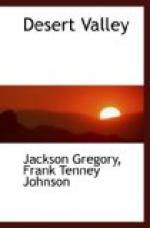It appeared that every one had heard the tale of Longstreet’s discovery and of Sanchia Murray’s manoeuvre. They made high fun of Longstreet and declared that Sanchia was a cool one. The mere fact that she was a woman enlisted their sympathies in an affair wherein they had no interest. They were doomed to second choice and deemed it as well for Sanchia to have had first as any one. When a narrow-headed individual remarked that he had heard that the widow was getting nothing out of it, but that Courtot and his crowd had cheated her, they hooted and jeered at him until he withdrew wondering at their insane attitude. It was generally taken for granted that Sanchia Murray knew what she was about. If she chose to hunt in couple with Jim Courtot, that was her business.
A town is something more than a group of men encamped. It connotes many social facilities; first among which comes the store and, in certain parts of the world, the saloon. Sanchia’s Town was, upon the first day, a town in these essentials. Shortly after dawn a string of three six-horse teams crawled across the lowlands and, by a circuitous way, to the camp. One wagon was heaped with bits of second-hand lumber and a jumbled assortment of old tents and strips of canvas. In it, also, were hammers, saws and nails. The two other wagons were filled with boxes and bags—and kegs. There were two men to each team. Arrived they gave immediate evidence that their employer had chosen well. One of them, a crooked-eyed carpenter named Emberlee, directed, hammer in hand. Before noon he had caused to grow up an architectural monstrosity, hideous but sturdy. It was without floor, but it had walls; wide gaps were doors and windows, but there was a canvas roof.
While his five companions brought their parcels into the place, Emberlee climbed aloft and nailed up a big board upon which his own hand, as the wagon had jostled along, had painted a sign. It spelled: JIM COURTOT’S HOUSE. Then he descended and began a hurried grouping of certain articles upon shelves and in corners. By the time the camp was ready for a noon meal the word had flown about that at Jim Courtot’s House one could get food, water and a widely-known substitute for whisky. Meantime Tony Moraga had come: he stood behind a bar hastily made of two planks set on packing cases and sold a tin cup of water for twenty-five cents, a glass of liquor for fifty. There were calls for both. Emberlee, plainly a jack-of-all-trades, began displaying his wares. He offered dried meats, tinned goods, crackers, cheese and other comestibles at several times desert prices. And he, too, chinked many a silver dollar and minted gold piece into his cash-box, because when men rush to gold diggings they are not likely to go empty-handed. Shortly after noon the three wagons returned to Big Run for more supplies.




